- Home
- Diana Wynne Jones
The Crown of Dalemark (UK) Page 6
The Crown of Dalemark (UK) Read online
Page 6
“We won’t need a taxi; it’s no distance,” Dad said. He pointed to the huge stone. “The old waystone,” he said, and set off striding into the town, “marking the start of the ancient road system of North Dalemark. King Hern, or most probably his descendants, made the roads, but simple people often thought the gods made them and tended to call them the paths of the Undying.”
Maewen pattered after him up a broad thoroughfare, listening to as much as she could hear of a series of little lectures. After the waystone, it was the traffic, then the circular road system invented by Amil the Great, then the goods sold in the expensive shops she could see on either side. Somewhere along the street, Wend caught up, carrying her suitcase, and she thought he said, “I’ll explain later,” but she was too confused to be sure.
She forgot everything, anyway, when they came between giant gilded gates in a high wall and she had her first sight of the palace. It was across a cobbled court, and it was majestic. Like a very graceful cliff, she thought, almost too big to take in, and all upright lines that made it look taller still. In front of it, right in the middle of the court, there was a very much smaller building. It caught Maewen’s attention for being so different from the palace that it looked quite out of place. It was like a house-sized model of a fairytale palace, with three small onion domes and such numbers of spiral towers that it looked almost absurd.
“Whatever is that?” she said.
“That? Oh, that’s the tomb of Amil the Great,” her father told her, and followed this up with one of the little lectures Maewen was coming to expect. “He completed the old part of the palace two hundred years ago, quite early in his reign. That’s Amil’s old facade we’re looking at now; those recessed arcades along the lower storeys were one of his own ideas. He was always full of ideas, but towards the end of his reign the ideas got rather out of hand, I’m afraid. Amil seemed to become obsessed with death and evil. He divided his time between having this tomb built and journeying all over the kingdom to eradicate what he called ‘pockets of Kankredin’. He simply meant places where there was injustice or lawlessness, but he had become very eccentric by then, and he preferred to call them that.”
“He was very old when he died, wasn’t he?” Maewen asked.
“Nearly ninety,” said Dad. “Come on inside. Give me that case, Wend. We’ll go up in the lift for once.” He set off across the big space, over a pattern of cobbles and flagstones, still lecturing. “Amil had seen this country through from two primitive groups of earldoms to a fully industrial society, so I think he earned the right to be a little eccentric. That tomb is by way of being his folly.”
DAD HAD AN enormous, spacious apartment right at the top of the Old Palace, filled with books and old furniture. The main room looked over the leads of the roof, where pigeons waddled to the windows, expecting crusts of bread for breakfast. Maewen’s bedroom looked out over the forecourt and the top of Amil’s mad little tomb to what seemed miles below, with a huge view of Kernsburgh beyond that, all dark trees and towers and square office blocks. The room was enormous, with almost nothing in it but a bed, a cupboard and a great threadbare carpet that had been old when Amil’s son imported it. Next door was a large clanking bathroom with plumbing so elderly that Maewen was more awed by it than anything else in the palace.
“I’m afraid I can only spare time to be with you in the evenings and early mornings,” Dad said over supper. Supper was supplied by one of a bewildering set of young ladies, who all seemed to wait on Dad hand and foot and then turn into secretaries in between. Seeing them, Maewen instantly knew that Dad regretted the divorce no more than Mum did. He was entirely comfortable. After supper he lit a pipe and explained, “We’re just moving into the height of the tourist season now. As soon as the palace opens to the public, I have to be everywhere at once. But I’ve told everyone that you can explore anywhere you want. Tomorrow I’ll make sure they all know you, so there won’t be any trouble.”
That evening they just talked, with Dad puffing clouds of pipe smoke through sunset light slanting in across the leading. Maewen found they got on. Dad seemed to think the same kind of thoughts that she did. Next morning he woke her quite surprisingly early and they had breakfast – supplied by another young lady – with rosy light slanting the other way across crusty rolls and rich black coffee. Just as Maewen was thinking how grown-up and leisurely this was, Dad sprang up and took her on a tour of the palace.
The Tannoreth Palace was vast. Buildings of various ages rayed out round courtyards with fountains, or gardens with statues and summer houses in them, and hedges and roses, and a small menagerie. At every huge room they came to – and on some of the stairways – at every picture or work of art or curious object, Dad gave her another of his little lectures. In between he was introducing her to bewildering numbers of people who worked in the palace: ladies in overalls polishing the long museum galleries or dusting gilded tables, security men, guides, secretaries, and Major Alksen, who was head of security. Maewen’s mind began to seize up. When Dad took her outside to be introduced to the gardeners, she was thinking, I shall never remember all this! Our minds are not the same after all. It was too early. Even though she was used to being up with the lark in the holidays to help Aunt Liss in the stables, she could see to a horse on autopilot, half asleep. This was different. No one introduced you to horses or expected you to know the history of the barn.
Afterwards she found the only thing she could remember from the entire tour was Major Alksen because he was so much her idea of a retired soldier. And Wend, of course. She was glad Dad had not reintroduced her to Wend. Maewen felt too much pure embarrassment to go near him.
But she felt she was letting Dad down, or wasting opportunities, or something. So when Dad had given her another of his swift, awkward kisses and rushed off, Maewen felt herself bound to go all over the palace again.
It took days. Some of the time she joined in the guided tours, having made sure first that the guide was not Wend, and the guides would give her a special smile among all the crowds of foreign schoolchildren, and ordinary families, and silk-suited men and women from Nepstan, and then go on with their spiel. She visited Amil’s tomb with one such crowd, but it was a cold, boring arched room inside, with a lot of gold lettering on the tombstone, and she only went there that once. She preferred indoors.
Here she usually started her sightseeing in the Old Palace, where most of the pictures were. That was easy to find because of the art students. They lay on the floor in what had been the great hall but was now a ballroom, copying the perspective in the ceiling picture. On the walls of this room Amil the Great, with his mane of fair hair and a roll of plans trailing from one hand, supervised the building of the palace. Amil was wearing purple breeches, which Maewen thought were decidedly unfortunate. They looked worse in the copies the students made of them. On the ceiling there was the whole of Dalemark spread out, from the plains and slow rivers of the South to the mountains of the North, and full of battling figures, as Amil (in the same purple breeches) led his armies against the rebellious earls at the start of his reign.
Next door to the ballroom was a smaller room where oil paintings hung in frames. This was where Maewen’s favourite pictures were. She got into the habit of stepping over the students lying on the floor and then pushing between the easels and the busy students in the smaller room in order to look at the portraits they were copying. The biggest was of the Duke of Kernsburgh, posed haughtily looking over the shoulder of a trailing crimson cape, in front of a new castle on a hill.
“Amil the Great’s chief minister,” Dad told her when she asked that first evening, “and one of the most ruthless men in history.”
Maewen could see the Duke was ruthless – it was in every fierce, clear line of him – but there was something familiar and almost friendly about him too. She almost felt as if she knew him. She kept trying to decide why. He looks as if he was very nice to his friends, she decided. But if you weren’t one of his friends, you had
to watch it. He’d put you to death without turning a hair.
The Duke was flanked by two dismal portraits of the Adon, both much, much older, and beyond that was an even older portrait of Enblith the Fair, who was supposed to have been the most beautiful woman ever, daughter of the Undying and a famous queen. The portrait was cracked, but even so Maewen could only suppose that ideas of beauty had changed. Enblith reminded her very strongly of Aunt Liss – and no one had ever called Aunt Liss a beauty, even when she was young. I bet she managed people into thinking she was lovely, Maewen thought. That was all women were supposed to be in those days. And she pushed between easels to the portrait that truly fascinated her.
It was called Unknown Minstrel Boy, and she kept wishing she knew more about him. He was probably about her own age, and he had red hair – which Maewen had always secretly wished for herself – with the paleness that always goes with such hair. He was rather richly dressed in dark maroon satin, so either he was a very good minstrel or a young aristocrat posing as one. Good minstrel, Maewen decided. It was in the way his pained eyes met yours and yet looked way, way beyond, full of thoughts and knowledge and strong sadness. Someone’s let him down badly, Maewen thought when she first met those eyes. She wished she knew who had and why. And kept going back to look.
She wanted so badly to know about that boy that in the end she joined the afternoon guided tour that went round the pictures. The advantage was that the students had gone home by then. The disadvantage was that this tour was always taken by Wend. It took Maewen several days to muster courage to go with it. When she did, the mere sight of Wend started her fizzing with embarrassment again. Wend saw her and gave her a polite little bow and a restrained smile. Maewen felt her face flooding with red. It was the awful way Wend never seemed to show any emotion but politeness. But she clenched her teeth and followed the other tourists.
The picture of the minstrel boy was famous for several reasons, she discovered. Nobody had ever been able to find out who the boy was, although he was important enough to have been painted by the best artist of the time. And he must have been important to Amil the Great too, because Amil made a special bequest of the picture to his grandson, Amil II. Books had been written about the picture. Some theorists suspected the boy was Amil himself, before he won the throne. Amil the Great had also carefully preserved the cwidder that had been painted with the boy. It was obviously old, even then. The minstrel boy had his hand dreamily wrapped across the cwidder, half hiding the strange old lettering inlaid on the front. And the actual selfsame cwidder was in a glass case just beside the portrait, very fragile and cracked-looking, despite careful restoration.
“Well, fancy that!” said everyone, raising cameras and jostling for the best shot of it.
After that Wend took the party into the ballroom, where he told them that the paintings on the wall and the ceiling had been done in the time of Amil II. Nobody knew what Amil the Great really looked like, and the purple trousers were a pure invention. This so amused Maewen that she left Wend’s embarrassing presence in order to go down to the hallway and buy a postcard of Amil in his breeches and write a “Wish you were here” message on it to Mum and Aunt Liss. Then she made a foray into Kernsburgh itself to post it.
The city was even more crowded than the palace, and the traffic was terrible. A very few glances into the shops as she passed showed Maewen that she had barely enough money even for ordinary presents for Mum and Aunt Liss. Kernsburgh sold things from all over the world, and it was expensive. But the distressing thing to someone who had been brought up in the country like Maewen was that the place seemed to have almost no trees once you were down on street level.
“Where do all the trees go?” she asked Dad that evening.
It was a perfect example of the way she and Dad got on. Dad knew just what she was talking about although he was busy laying out sheets of stiff paper and notebooks on the other end of the table. “In people’s gardens, I think,” he said. “I believe Amil the Great planned it that way, because there were no trees on the site when he started to rebuild Kernsburgh.”
“Then he made a mistake,” Maewen said. “It’s all buildings and cars, and it makes me cough.”
“You’d have coughed worse when the place was new,” Dad said. “Two hundred years ago it would have been smog from coal fires. Though I’m never sure it was such a good thing when they discovered oil under the Marshes. It makes the Queen a rich woman, I suppose, but it has its drawbacks.”
“Where is the Queen?” Maewen asked. “I’ve been almost all over the palace now, and—”
“Oh, she very rarely comes here these days,” Dad said. “She’s pretty old, you know, and she prefers the warmth in the South. She almost only ever comes to the Tannoreth for state occasions.”
“And the Crown Prince?” Maewen asked, feeling rather let down.
“He lives in Hannart,” Dad answered absently, busy with a notebook. “Doesn’t get on with his mother or with public events.”
“What are you doing?” Maewen asked him.
“Trying to establish our family tree,” said her father. “It’s a hobby of mine – and damned exasperating too. You can come and look if you like.”
Maewen came and leant on his square, warm shoulder, and he spread scrawled books and careful diagrams out for her to see. “Here,” he said. “My family. As far as I can tell we go back to one of the travelling Singers. I think his name may have been Clennen, but Singers wandered about so and were so little documented that it’s a fiendish job to find out for sure. Compared with that period, the last hundred years were a doddle, and I thought those were bad enough. And when we get to your mother’s family, things get even worse. Here.” Dad pushed sheets of paper in front of Maewen, hectically scrawled all over in pale pencil. “See? There’s some connection with Amil II’s brother Edril, but that’s as far as—”
“You mean Mum descends from Amil the Great!” Maewen exclaimed.
“So do a lot of people. If you mean that accounts for your mother’s standoffish vagueness,” Dad said drily, “I hardly think so. If you remember that everyone has four grandparents and eight great-grandparents, you can see that almost everyone has to be related if you go back far enough. We’re talking here about doubling the number of ancestors each person has every generation, and halving – or even quartering – the number of people those ancestors could have come from. The population of Dalemark was quite small until a hundred years ago.”
He was lecturing again. Maewen tried to listen. She was quite interested in the difficulties Dad had had sorting out the two generations around the time of Amil the Great. School history didn’t tell you half the confusions and revolutions there had been then. But there was so much of it. It had been dark for hours and she was yawning before Dad said, “Well, that will have to do for now. I’ve another long day tomorrow.”
Once she was in bed, Maewen tried to sort out how she felt about Dad and the divorce. She was very fond of Dad – achingly, fiercely fond – but not so much when he lectured. And try as she might, she could not be upset that he was quite happy to be divorced from Mum. She had expected to feel sad – she felt she ought to feel sad – but whenever she passed the big busy office on the floor below and saw Dad conferring with secretaries, snapping instructions at Wend, or consulting with Major Alksen – and sometimes all three at once – she was glad she did not have to live with him and Mum at once. These were two strong-minded people who were both utterly buried in their work. And one of those, Maewen felt, was enough at one time.
Next morning, as she chucked pieces of bread on to the leads for the fat waddling pigeons, Maewen discovered that sorting that out about Dad had somehow let her off having to remember everything about the palace. As it was another baking hot day, Maewen decided to go for a swim. Major Alksen had said she could use the staff bathing pool. But he had not said where it was. She set out to find him and ask him.
Downstairs she went to the office. It was so busy that thoug
h she could hear Dad’s voice, she could not see him among all the other hurrying people. And the secretary nearest the door said that Major Alksen had already gone down to his security post. Maewen went down again to the great upper galleries of the palace, which were cool and quiet and empty yet, until the palace opened to the public. These long rooms were a sort of museum, where curios and clothes belonging to past kings and queens sat in cases among statues and pieces of carving that had once been on the outside of the palace. As a lot of the things were very valuable, Major Alksen was often there, patrolling with a radio phone, checking security. As she came into the first room, Maewen could hear his footsteps ringing in the distance somewhere and his voice talking into his radio. “Coming through Gallery Two now. All secure. Over.” She made towards the sound.
The person she saw when she went round the corner was Wend. Maewen stopped. How had he sounded so exactly like Major Alksen? Luckily Wend’s handsome face was set intently on distance as he listened to the voice on his radio. He had not seen her. Full of embarrassment again, Maewen started to tiptoe softly round the corner.
“Don’t go, Maewen,” said Wend. “I’ll be with you in a moment. Right. Everything in place here. Over and out.”
What excuse could she possibly give for rushing away? Maewen wondered. So sorry, I need to swim this second. Forgive me, but I have to go and depress myself at once by seeing Amil’s tomb. Excuse me, I must go and look at the Duke of Kernsburgh – urgently. Or she could just run away. But Wend was already turning towards her, and the only thing she could think of was to let him explain why he had been sent to meet her as if she were ten years old and get it over with.

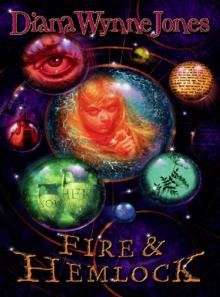 Fire and Hemlock
Fire and Hemlock Reflections: On the Magic of Writing
Reflections: On the Magic of Writing The Game
The Game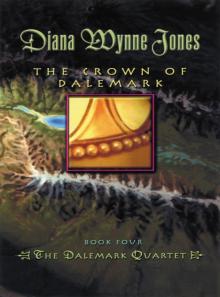 The Crown of Dalemark
The Crown of Dalemark Deep Secret
Deep Secret Witch Week
Witch Week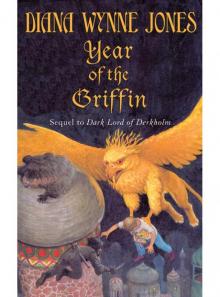 Year of the Griffin
Year of the Griffin Wild Robert
Wild Robert Earwig and the Witch
Earwig and the Witch Witch's Business
Witch's Business Dogsbody
Dogsbody Caribbean Cruising
Caribbean Cruising Cart and Cwidder
Cart and Cwidder Conrad's Fate
Conrad's Fate Howl's Moving Castle
Howl's Moving Castle The Spellcoats
The Spellcoats The Pinhoe Egg
The Pinhoe Egg Drowned Ammet
Drowned Ammet The Ogre Downstairs
The Ogre Downstairs Dark Lord of Derkholm
Dark Lord of Derkholm Castle in the Air
Castle in the Air The Magicians of Caprona
The Magicians of Caprona A Tale of Time City
A Tale of Time City The Lives of Christopher Chant
The Lives of Christopher Chant The Magicians of Caprona (UK)
The Magicians of Caprona (UK) Eight Days of Luke
Eight Days of Luke Conrad's Fate (UK)
Conrad's Fate (UK) A Sudden Wild Magic
A Sudden Wild Magic Mixed Magics (UK)
Mixed Magics (UK) House of Many Ways
House of Many Ways Witch Week (UK)
Witch Week (UK) The Homeward Bounders
The Homeward Bounders The Merlin Conspiracy
The Merlin Conspiracy The Pinhoe Egg (UK)
The Pinhoe Egg (UK) The Time of the Ghost
The Time of the Ghost Hexwood
Hexwood Enchanted Glass
Enchanted Glass The Crown of Dalemark (UK)
The Crown of Dalemark (UK) Power of Three
Power of Three Charmed Life (UK)
Charmed Life (UK) Black Maria
Black Maria The Islands of Chaldea
The Islands of Chaldea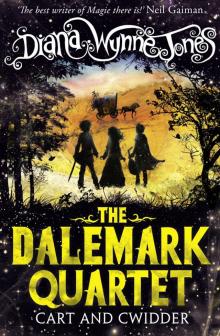 Cart and Cwidder (UK)
Cart and Cwidder (UK)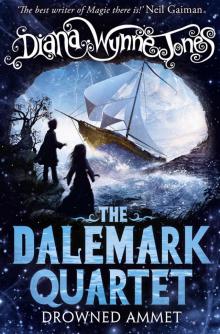 Drowned Ammet (UK)
Drowned Ammet (UK) Charmed Life
Charmed Life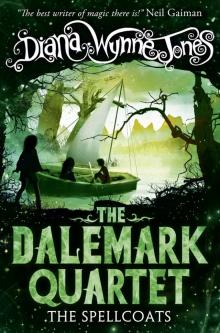 The Spellcoats (UK)
The Spellcoats (UK)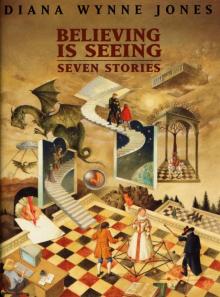 Believing Is Seeing
Believing Is Seeing Samantha's Diary
Samantha's Diary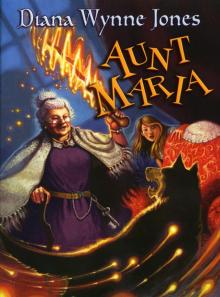 Aunt Maria
Aunt Maria Vile Visitors
Vile Visitors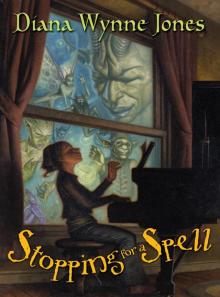 Stopping for a Spell
Stopping for a Spell Freaky Families
Freaky Families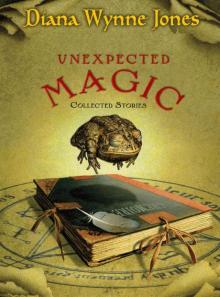 Unexpected Magic
Unexpected Magic Reflections
Reflections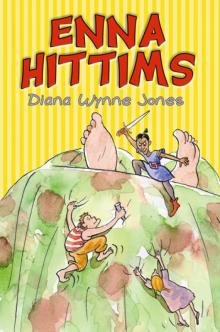 Enna Hittms
Enna Hittms Mixed Magics: Four Tales of Chrestomanci
Mixed Magics: Four Tales of Chrestomanci